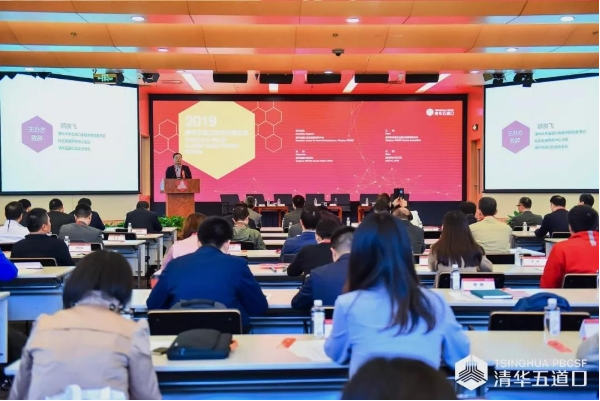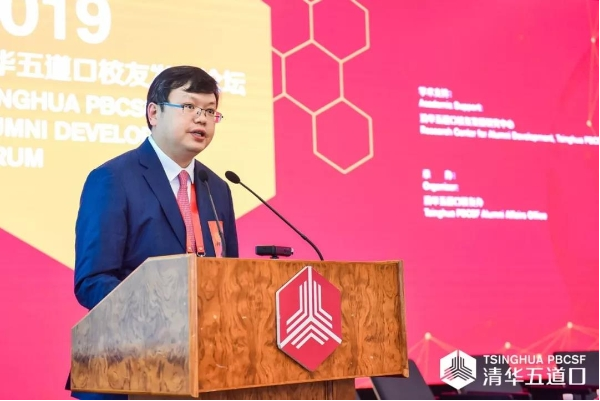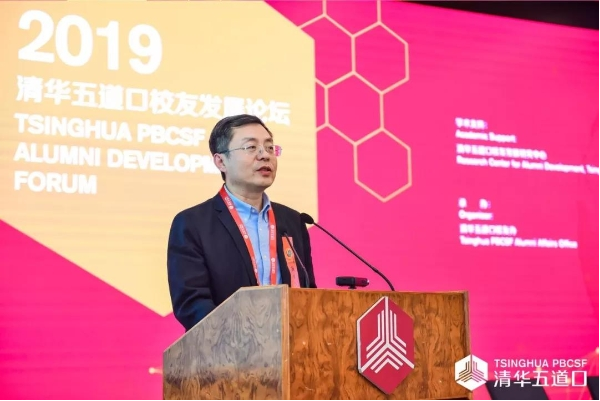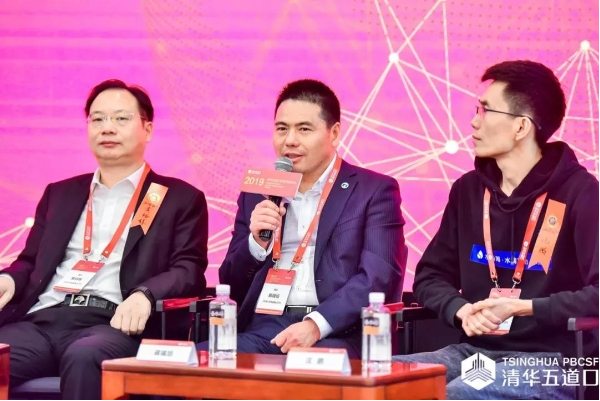On April 27, the 2019 Tsinghua PBCSF Alumni Development Forum was held at Tsinghua PBCSF. Jiang Xipei was invited to attend the forum and delivered a speech during the theme session on “How to promote the development of private enterprises by financial policy”.
This forum was presided over by Zhang Wei, who was enrolled in the Master Program in 1999, Director of the Tsinghua PBCSF Alumni Affairs Office, Deputy Director of the Alumni Development Research Center and Secretary General of Tsinghua PBCSF Alumni Association. The topics of the forum were “How does finance facilitate the development of private enterprises” and “How does multi-level capital market promote technological innovation”, which attracted interest of alumni from different programs.

Scene of the forum

Secretary General presides over the forum
Gu Liangfei, Secretary of the Party Committee of Tsinghua PBCSF, Director of the Alumni Development Research Center and President of Tsinghua PBCSF Alumni Association, delivered a speech and put forward three suggestions on the development of the school, the orientation of alumni work and the alumni development forum, i.e., to inherit its characteristics of schooling and innovate the way of training high-end international financial talent; to carry forward the spirit of Tsinghua PBCSF and promote the common development of alumni and the school; to promote alumni integration was the initial intention and mission of the alumni development forum.

President Gu Liangfei delivers a speech

Jiang Xipei delivers a speech during the theme session
on “How to promote the development of private enterprises by financial policy”
As the monitor of 2016 Global Finance GFD and member of the council of Tsinghua PBCSF Alumni Association, Jiang Xipei set forth the following four points of view in his speech on the theme of “How to promote the development of private enterprises by financial policy”:
First of all, change the concept. General Secretary Xi Jinping and Premier Li Keqiang not only regard private enterprises as people on their own side but also the people they care about most. They emphasize the unswervingly support for China’s good enterprises to participate in global competition and realize sustainable development.
Second, top-level design. Jiang Xipei pointed out that, although many regulations and laws became more and more perfect, there was still much room for optimization. For example, the launching of science and technology innovation board was good, but in China, there were over 3,000 companies listed in A-share market and over 10,000 companies got listed in NEEQ, which were the backbone of China’s economy. Therefore, the successful operation of these companies heralded the steady development of China’s economy.
He added that we should solve unrealistic and unpractical movements such as restriction on sales and pledge of stock as soon as possible. Of course, it was important for banks to support small and medium enterprises (SMEs). But we should fully understand that financing difficulties and high financing costs were universal problems with reducing taxes and fees as the best solution.
Meanwhile, reduce institutional discrimination. Central enterprises, state-owned enterprises, etc. shouldn’t enjoy more preferential policies. Treat equally without discrimination was still an empty promise; in addition, it was necessary to continuously optimize laws and regulations, for example, in tendering and bidding activities, the lowest-price tendering method was still adopted, which ran counter to the law of the market, laws of economics and the high-quality sustainable development advocated by the state. It cost a lot to manage the market and economy in such a simple way.
Third, keep abreast of the time and the nation. We should understand this era and the governing ideas of the general secretary and the premier. General Secretary Xi cares about every enterprise and every citizen. On the national conference on poverty alleviation, General Secretary Xi Jinping put the Chinese Government had to win the battle against poverty and saw that poor people and poor areas would enter the moderately prosperous society together with the rest of the country by 2020. This was a pioneering work worldwide, and it was obvious that all the efforts aimed to make our country and nation prosperous and strong.
Fourth, supervise the implementation. Take a look at the implementation of the policies. The General Office of the CPC Central Committee and the General Office of the State Council had set a good example for our enterprises. They supervised the implementation of movements and requirements in the Report to the 19th CPC National Congress, as well as the reports to NPC&CPPCC. With so many delicate tasks to fulfill, our country still finished the supervision excellently. However, many enterprises failed to keep up with the pace.
The following alumni also attended the forum, they were Zhang Jianhua, who was enrolled in the Master Program in 1987 at Tsinghua University PBC School of Finance and President of HUAXIA BANK, Yu Dexiang, who was enrolled in Finance EMBA program in 2016 and Chairman of TGOOD, Huang Yuhui, who was enrolled in Global Finance GFD program in 2014, Chairman of Nantong No.3 Construction Group and member of the council of Tsinghua PBCSF Alumni Association, as well as Shen Peng, who was enrolled in the Global Entrepreneurship Leadership Program in 2016 and Founder of Shui Di Chou.
There were 17 alumni from different fields who shared their ideas and delivered keynote speeches successively at this forum. At last, the forum ended perfectly in a harmonious atmosphere.
